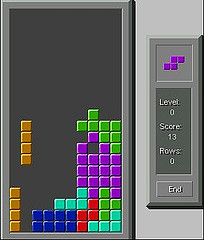This is a topic that’s been on my mind a lot lately while I’ve, well, been wasting time. I feel like I haven’t done any significant writing for almost a year. (Heck, I haven’t even been blogging!) Some of that was unavoidable — personal issues to deal with, classes and a full time job that I have to actually be present for, etc. But some was self-inflicted, unnecessary procrastination.
And while I’ve read some great blog posts about effective time-management, they all seemed to fall short in one crucial way.
None of them talked about why we waste time.
To me, that seems like the most important question to ask. After all, just trying to apply remedies without knowing the root cause is like prescribing medication without a diagnosis. Treating the symptoms, not the disease.
And it’s something that a lot of writers (and folks in general!) struggle with. I mean, we all want to believe that we’re the most driven, passionate and over-achieving people we know, especially when we’re bombarded by all these success stories of writers who’ve already churned out 20 books this year and are planning 50 for next month before they retire with their 16-digit royalty payouts on their own private Caribbean island resort.
Okay. Maybe not quite, but you know what I mean. You know those stories, the ones that make you feel inadequate if you’ve only written a measly 5,000 words in one day.
 But let’s face it. Most of us are only human. We write what we can, when we can, and just trudge along trying to do our best. Sometimes, though, we just. don’t. do. anything. We have precious few hours to devote to our craft each day, and we fritter them away. We know that wasting time just cripples our productivity, so why do we insist on doing it?
But let’s face it. Most of us are only human. We write what we can, when we can, and just trudge along trying to do our best. Sometimes, though, we just. don’t. do. anything. We have precious few hours to devote to our craft each day, and we fritter them away. We know that wasting time just cripples our productivity, so why do we insist on doing it?
Maybe the first question should be — do we even realize we’re doing it? (First step to fixing a problem, mate…)
So, I’ll use myself as an example. What does wasting time look like for me? I’ll give you one word.
Internet
Oh yes, that soul-sucking, time-devouring destroyer of serenity, the internet. That is, by far, my #1 time sink.
- Facebook. Don’t even get me started on FB. I tell myself, “Oh, I’m not really that active on FB. I hardly ever post anything.” “Oh, really, self?” say I. “Then why do you obsessively load and reload that cursed bane of your existence throughout the day?” And I realize that, even if I’m not posting much, if I added up all the seconds I spend scrolling mindlessly through an endless news feed, taking inane Buzzfeed quizzes (don’t laugh — you know you want to know what flavor of cupcake you are, too), feeding trolls who lurk in the quagmire of political and religious posts…yeah. It’s a huge waste of time.
- Twitter. Twitter is less of a problem for me. I get on to see if I’ve got notifications, scan through the last, oh, 5 seconds of stories (i.e., the last 75,023 stories), try desperately to come up with something witty to say in 140 characters or less, fail epically, and close the window. But still. I repeat this process several times a day. Why? Glutton for punishment? I don’t know.
- Puzzles. Puzzles, you say? Oh, dear Lord, yes. Puzzles are the evil. I’m a sucker for anything puzzling, whether numbers or jigsaws or those stupid little FB games that are way too addictive. I usually give the excuse that it’s a passive thing to do while I’m thinking over a scene or a plot or how to take over the world, or whatever. Truth is, I just like puzzles. And more often than not, I’m not thinking about much of anything except pretty shapes and colors and why oh WHY dear God can’t I ever get any writing done???
- Obsessing over reviews. Yeeahh…if I took all the time in the day that I spend loading Goodreads, Amazon, Barnes & Noble, Smashwords, etc. to see if I’ve gotten any new reviews (nope, still no new ones in the last three minutes, or… months), I could probably write a solid chapter of exciting new story, and edit it (twice).
Non-internet Time-Sinks
- Video games. Okay, I don’t waste as much time gaming as I used to, but still. I might play half an hour here, an hour there over the course of a week, but that’s pretty significant when you add it up (and especially when you have a penchant for lamenting that you never ever have any time for anything).
- Sleep. Yeah, okay, sleep isn’t really a waste of time. But sometimes it feels like it is. Because, you know. Sleep.
There you have it. As you can see, most of my wasted time is swallowed by the internet…and I’d say 95% of it is swallowed by digital activities of some sort or another.
Now the question is, why am I doing it? Because believe me, I’m well aware (and thoroughly lament the fact) that while I’m scrolling through FB for the thousandth time this morning, I could be writing. And yet…I don’t.
Fear
Fear is a strong word, but sometimes it’s the right word. Sometimes we waste time because we’re afraid to take the leap and tackle some project. This is a big one for me. These are the top reasons I might be afraid to apply myself to a task:
- Fear of failure. Yeah, I may be afraid that whatever I try to do will suck like a black hole. I’ve been writing a long time, and I’ve got four books out, and yet I still fear that when I start a new book, it will be the worst piece of literary detritus ever conceived by the mind of man. What if I can’t finish? What if my ideas are all totally lame, and I just don’t know it? What if I embarrass everyone who knows me with my utter and overwhelming lameness?
- Fear of disappointment. Slightly different than fear of failure, this is the fear that after I’ve invested long hard hours and blood, sweat and tears for a novel, I just won’t care. I won’t like it. And, if no one else likes it either, I will have wasted all that energy for nothing. I won’t even make any money for consolation.
- Fear of disappointing readers. Now that I actually have some readers who are interested in my books and who encourage me and cheer me on, I’m dead scared of disappointing them. What if the next book I write is SO BAD, that they can’t believe they ever liked anything I wrote? What if I’m just another wannabe who fizzles out fast and leaves nothing for anyone to care about? What if, what if?
Those are the biggies for fear, for me. What are some other reasons I waste time?
Uncertainty
- Lack of Clarity. Sometimes I waste time when I just have no clear picture where I’m going to take a story. As if browsing FB for the billionth time this hour is going to miraculously shower me with wisdom and insight into my current plot (or lack thereof). Because that makes perfect sense. But when I’m really unclear about my project, I will avoid it at all costs.
- Lack of Confidence. This goes back to some of those fear issues. I may just feel like I’m not up to the task. Maybe I’m not as good a writer as I deluded myself into believing. Maybe no one really cares. Maybe I shouldn’t even bother.
- Lack of Understanding. Sometimes a project is so immense that I feel unequal to the task of writing it. I feel like, if only I had the psychological insight of a Dostoevsky, my characters would be brilliant. If only I had as much life experience as, say, David Farland or Brian Jacques, I would know how to write this plot better. If only I’d actually had a chance to get shipwrecked in an icy sea on some jagged rocks, this scene would be so easy to write. (Okay, maybe not….)
- General Life Uncertainty. Let’s be honest. Sometimes wasting time instead of writing has nothing to do with writing per se. Maybe it’s because I’m facing a general sort of fuzziness about what the heck I’m doing with my life, in the grand scheme of things. That kind of uncertainty is enough to paralyze most of my endeavors, and quite frankly, wasting time becomes a way to try to stave off depression. However, instead of confronting the problem, I end up exacerbating it because all I can see myself doing is wasting more of the life that I’m…worried I’m wasting.
In fact, that’s the thing about wasting time — for any of the reasons I listed, or for any other reasons people might have. It. Doesn’t. Solve. Problems.
Let me say that again.
Wasting time doesn’t solve problems.
In fact, it can turn into a vicious cycle. I’m afraid I’ll be a failure, so I don’t write, which makes me less successful, which makes me more afraid I’ll be a failure, which makes me waste more time. I lack clarity about the story, so I waste time, which means I don’t think about the story, which means I still lack clarity. Lather, rinse, repeat.
Now, all these reasons might not be true for every given instance of time-wasting-behavior. So, while you can pore over articles and checklists and how-to’s to get your life organized, if you don’t stop and think about why you’re wasting time right now, those efforts — no matter how well-intentioned — are not going to help in the long term.
Instead, try to pick one particular way — a small goal, if you will — to help confront whatever problem you’re facing.
Unsure where your current WIP is going? Write a “letter to a friend” describing the story. Don’t worry about contradicting yourself, about being grammatically correct or stylistically polished. Don’t worry if you write complete and utter garbage. Just start writing. Write about the characters, who their enemies are, what they ate for breakfast, whatever. Sometimes that can be a great help.
Or, write an outline! For me, I feel like if I don’t start out knowing exactly all the plot points in my story, I shouldn’t bother outlining it. After all, you write an outline after you know all the information, right? Well, no. Sometimes you need the outline to see where the holes are. So don’t be afraid to write an outline that looks like this:
- Howard goes to the castle
- Howard meets the princess
- The princess tries to stab Howard (how rude!)
- Blah blah blah.
- Stuff happens.
- Howard maybe runs away??? Does the princess chase him or maybe did she get trapped in an oubliette??
- Blah blahh blahhhhhh.
- Awesome dramatic climax where Howard discovers the princess is under a terrible curse and breaks her free!
- Blah blah.
- Howard is now under the curse. The end.
Then just start brainstorming where all the filler stuff is. Write the wackiest things you can think of, if you can’t think of anything sensible. Just….WRITE.
 Or…and this is the one that I always get stuck on…write something else. I always think, “But I can’t! I have readers waiting for X! I can’t work on Y!” So, instead of writing on a new project, I desperately try to reach level 431 of Tetris. Not helpful. When I try to calculate how much I could have written on a new novel while I had “writer’s block” for the novel I was “supposed” to be working on (notice the excessive use of “quotes”), it’s a bit depressing.
Or…and this is the one that I always get stuck on…write something else. I always think, “But I can’t! I have readers waiting for X! I can’t work on Y!” So, instead of writing on a new project, I desperately try to reach level 431 of Tetris. Not helpful. When I try to calculate how much I could have written on a new novel while I had “writer’s block” for the novel I was “supposed” to be working on (notice the excessive use of “quotes”), it’s a bit depressing.
Feeling uncertain about your life? Sit down with a trusted friend and just talk about your uncertainties, your fears, your goals. Figure out why you aren’t happy where you are, and what accomplishments you want to remember when you’re older. Make a bucket list. Make a goals poster. And if writing figures at all into those things, ABC (apply butt to chair) and write something, anything, good, bad, short, long, whatever. Just. Get. Writing.
So, whatever your issue is, focus on finding just one way to inch back in the right direction. You don’t have to solve all your problems all at once. You don’t have to write a masterpiece overnight and plan 60 new novels for the next week. Just turn off your wi-fi, or grab a pen and notebook and go to the park, and do something — anything — that you can count as progress in your writing. Maybe it’s character sketches. Maybe you want to write out descriptions of every outfit in your main character’s wardrobe. Maybe you want to write a vignette about your character’s crazy old neighbor who gets all of one mention in the novel. It doesn’t matter.
You’re writing. You’re working on your craft. You’re improving. You’re succeeding.
You’re not wasting time.
What are the biggest reasons you waste time? What are your best ways to break through them? Leave a comment below!

Photo credit: Valokuvaaja Joonas Tikkanen / Foter/ Creative Commons Attribution-NoDerivs 2.0 Generic (CC BY-ND 2.0)
Photo credit: @joefoodie / Foter / Creative Commons Attribution 2.0 Generic (CC BY 2.0)







 Or…and this is the one that I always get stuck on…write something else. I always think, “But I can’t! I have readers waiting for X! I can’t work on Y!” So, instead of writing on a new project, I desperately try to reach level 431 of Tetris. Not helpful. When I try to calculate how much I could have written on a new novel while I had “writer’s block” for the novel I was “supposed” to be working on (notice the excessive use of “quotes”), it’s a bit depressing.
Or…and this is the one that I always get stuck on…write something else. I always think, “But I can’t! I have readers waiting for X! I can’t work on Y!” So, instead of writing on a new project, I desperately try to reach level 431 of Tetris. Not helpful. When I try to calculate how much I could have written on a new novel while I had “writer’s block” for the novel I was “supposed” to be working on (notice the excessive use of “quotes”), it’s a bit depressing.



